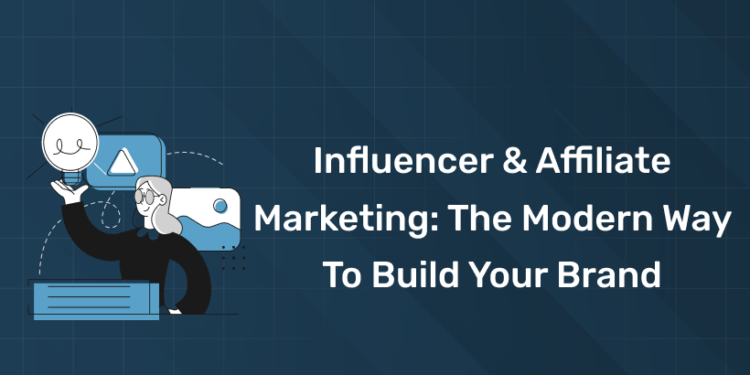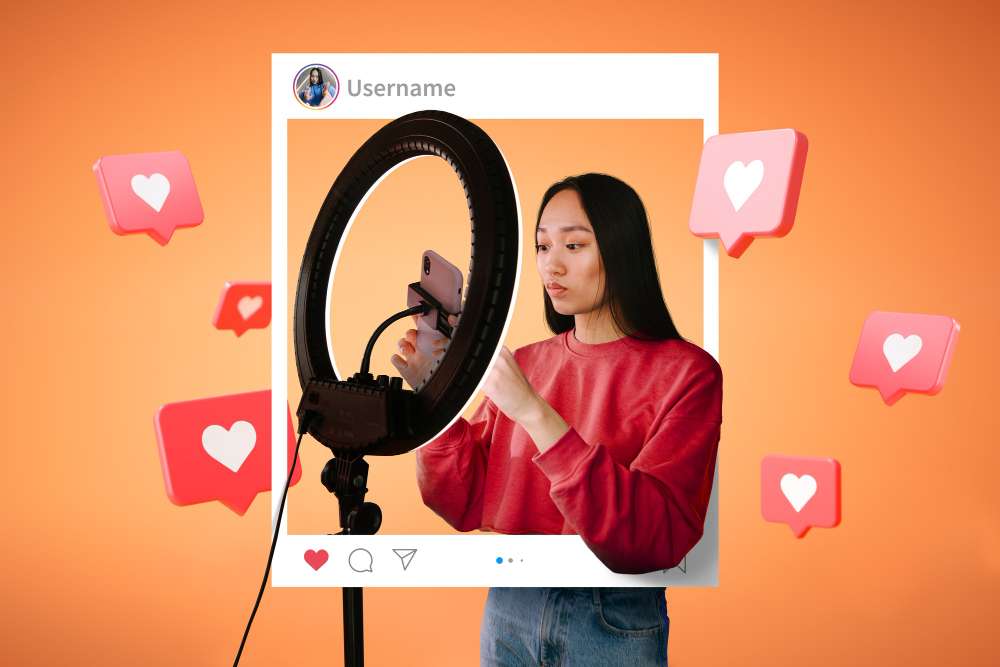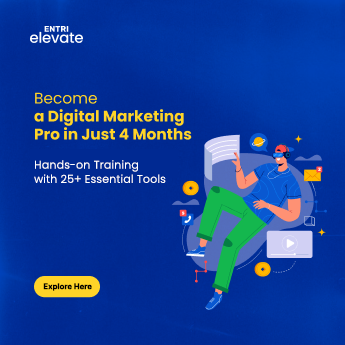Table of Contents
You have noticed how often you buy something after seeing a friend, celebrity, or YouTuber recommend it? That’s not a coincidence. That’s the power of influence.
In the modern marketing world, people don’t trust loud ads anymore. They trust the people creators they follow, writers they read and communities they’re part of. This shift has turned Influencer Marketing and Affiliate Marketing into two of the most effective growth strategies for businesses in 2025.
Both are about more than just promotion. They’re about trust, storytelling, and authenticity, three ingredients modern brands can’t survive without.
If you’re building your own brand or learning digital marketing, understanding how these systems work will help you grow smarter and faster. Let’s dive in.
Join Our Online Digital Marketing Course & Learn the Fundamentals!
Influencer Marketing: Building Trust Through People
Influencer marketing isn’t new. Word-of-mouth has always existed; it’s just gone digital.
An influencer is simply someone who has built a following in a particular niche fitness, travel, tech, finance, or even baking, and can influence how their audience thinks, feels, or buys.
For example, a skincare creator on Instagram sharing how a product worked for her isn’t just posting, she’s endorsing with credibility.
Why It Works
- People trust personal experiences more than brand slogans.
- Niche influencers reach audiences that already care about your product.
- Authentic content feels organic, not intrusive.
In essence, influencer marketing converts followers into believers and believers into buyers.
Affiliate Marketing: Rewarding Performance
1: What is the primary goal of SEO (Search Engine Optimization)?
If influencer marketing builds awareness, affiliate marketing ensures results.
Here’s how it works:
You partner with individuals or businesses (affiliates) who promote your product. When someone buys through their referral link, they earn a commission.
It’s a win-win system: brands get sales and affiliates earn income by helping those sales happen.
Why It Works
- Brands pay only for real results (clicks, leads or sales).
- Affiliates feel motivated because their income grows with performance.
- It scales easily one affiliate can become a hundred with the right system.
Affiliate marketing turns enthusiastic promoters into your extended marketing team.
Become an AI-powered Digital Marketing Expert
Master AI-Driven Digital Marketing: Learn Core Skills and Tools to Lead the Industry!
Explore CourseInfluencer Marketing vs Affiliate Marketing: Two Sides of the Same Coin
Though they often overlap, there’s a subtle difference between the two.
| Aspect | Influencer Marketing | Affiliate Marketing |
| Goal | Build trust and awareness | Drive measurable conversions |
| Compensation | Fixed payment or barter | Commission per sale or lead |
| Content Style | Authentic storytelling | Action-oriented promotion |
| Tracking | Brand metrics (reach, engagement) | Sales or lead-based tracking |
| Duration | Usually short-term | Often long-term partnerships |
In reality, smart brands combine both. Influencers build the emotional connection, while affiliates drive conversions. Together, they form a powerful growth cycle.
How to Build an Influencer Marketing Strategy That Actually Works
Too many businesses treat influencer marketing like hiring a celebrity for a one-off post but that almost never works anymore.
The true worth is in developing connections, not deals. Here’s a step-by-step guide:
Step 1: Know Your Goal
Do you want more brand recognition, web traffic, or direct conversions? Be specific. Clear goals enable you to determine achievement and select appropriate influencers.
Step 2 – Identify the Right Influencers
Seek relevance, not reach. A micro-influencer with 10,000 devoted followers who actually care about fitness could convert better for a sports brand than a celebrity with a million distracted followers.
Step 3: Verify Engagement and Audience Compatibility
Use free tools such as Social Blade or Upfluence to double-check engagement rates. Real influencers have real engagement, not fake metrics.
Step 4: Write a creative brief, not a script.
Inform influencers what you represent your narrative, and your product advantages, and allow them to announce it in their own method. Their tone builds the connection.
Step 5: Track the Outcome
Get mobile app exclusive coupons. Influencer marketing isn’t about vanity metrics; it’s about actionable ones.
How to Develop a Money-Making Affiliate Marketing Machine
Affiliate marketing is built on organization, openness, and confidence. If you do it right, it’s one of the most cost-effective ways to grow your business on the web.
Here’s how to start:
Step 1: Set Your Objective
Figure out what success looks like for you, is it more leads, product sales or app installs. Different objectives may call for different affiliate types.
Step 2: Select Your Platform
You can either:
Become a part of networks such as ShareASale, CJ, or PartnerStack. Or develop your own in-house affiliate programme with Tapfiliate or Post Affiliate Pro.
Step 3: Offer Attractive Commissions
Your affiliates are your partners. Compensate them generously, often 10-30% of every sale to keep them motivated and loyal over time.
Step 4: Provide Resources
Make it simple for affiliates to sell for you. Post banners, product images, videos, and pre-made text links.
Step 5: Track and Improve
Review affiliate performance monthly. Double down on top performers, polish or replace the duds. The numbers tell your tale follow them.
Become an AI-powered Digital Marketing Expert
Master AI-Driven Digital Marketing: Learn Core Skills and Tools to Lead the Industry!
Explore CourseIntegrating Influencer and Affiliate Marketing for Maximum Growth
The best brands don’t choose between influencer and affiliate marketing; they combine them.
Here’s how a hybrid system works:
- Influencers introduce your brand to new audiences with engaging content.
- They use affiliate links or codes so that every sale can be tracked.
- You measure results, reward performance, and continue partnerships with the best-performing creators.
This system brings the emotional appeal of influencer marketing and the performance focus of affiliate marketing together, making it one of the most powerful strategies in digital branding.
Why Brands Prefer This Approach
Today’s digital consumer is immune to traditional advertising. People skip, scroll, and mute anything that feels too promotional. But they listen to real people.
Influencer and affiliate marketing cut through the noise because they come from voices people already trust.
In India, this approach has grown rapidly. Small and medium businesses are increasingly using regional creators and affiliate bloggers to drive both visibility and conversions not through force, but through connection.
Measuring Success the Right Way
The beauty of these strategies is that you can measure almost everything.
For influencer campaigns, track:
- Engagement rates (likes, comments, shares)
- Website visits from influencer content
- Growth in followers or brand mentions
For affiliate marketing, measure:
- Click-through rates
- Conversion percentages
- Sales value from affiliate links
Tools like Google Analytics, HubSpot, or Impact.com make this process transparent and data-driven.
Common Pitfalls to Avoid
While influencer and affiliate marketing sound simple, there are traps beginners often fall into:
- Choosing influencers based on followers, not relevance.
- Ignoring disclosure rules (always mention partnerships).
- Offering low commissions that don’t motivate affiliates.
- Not following up with data-driven improvements.
Both strategies are relationship-based, not one-time transactions. Consistency builds success.
Join Our Online Digital Marketing Course & Learn the Fundamentals!
The Mindset Behind Modern Marketing
Modern marketing isn’t just about selling, it’s about sharing stories that build communities.
Influencers and affiliates act as your brand’s ambassadors, translating your message into everyday language.
That’s why many entrepreneurs today invest time in understanding how these systems work, not just outsourcing them. It’s no longer optional; it’s a core business skill.
Upskill Before You Scale: Learn with Entri
So you want to grow your digital brand? You need more than just theory, you need practical skills.
That’s where the Entri AI-Powered Digital Marketing Course comes in.
This course teaches you the strategies that work in real life, including influencer outreach, affiliate setup, content creation, analytics, and paid growth campaigns.
What makes it different is how it uses AI tools and real business scenarios so you can build, test and scale your marketing ideas with confidence.
Whether you’re a beginner, a startup founder, or someone looking to freelance in digital marketing, Entri gives you the foundation to grow your brand the smart, data-driven way.
Key Points
- Influencer marketing is about trust; affiliate marketing is about results.
- Combining both gives you long-term brand visibility and measurable sales growth.
- Authenticity, fair partnerships, and data tracking are key to success.
- Continuous learning through platforms like Entri turns ideas into income.
Conclusion: The Future is Authentic Growth
The future of digital marketing is human connection, and Influencer and Affiliate Marketing are its two strongest pillars.
Brands that value people, partnerships, and performance will win. Those who don’t will be forgotten.
By mastering these systems and applying them strategically, you can take your brand from being seen to being remembered.
And with the right training, like Entri’s AI-powered digital marketing courses, you’ll have everything you need to build a future-proof, scalable brand that grows on trust, not noise.
Frequently Asked Questions
What is influencer marketing?
Influencer marketing is a strategy where brands collaborate with influencers to promote products to their audiences authentically.
What is affiliate marketing?
Affiliate marketing involves paying commissions to individuals or websites that promote and sell your products through unique referral links.
Can small businesses use influencer marketing?
Yes, micro-influencers with smaller but highly engaged audiences are perfect for small businesses.
How do you find the right influencer?
Use influencer discovery tools or social media platforms to find people whose followers match your target audience.
What are the benefits of affiliate marketing?
It’s cost-effective, performance-driven, scalable, and provides measurable ROI.
What’s the difference between influencer and affiliate marketing?
Influencer marketing focuses on awareness; affiliate marketing focuses on sales and conversions.
Is influencer marketing expensive?
It depends on the influencer’s reach, but many brands now work with affordable micro-influencers.
Can both strategies work together?
Yes! Combining influencer and affiliate marketing creates a complete funnel from awareness to conversion.
How do I track affiliate performance?
Use analytics tools like Google Analytics, Tapfiliate, or Refersion to monitor sales and clicks.
How can I learn influencer and affiliate marketing professionally?
Join Entri’s AI-powered Digital Marketing Course to gain hands-on knowledge and real-world marketing skills.















